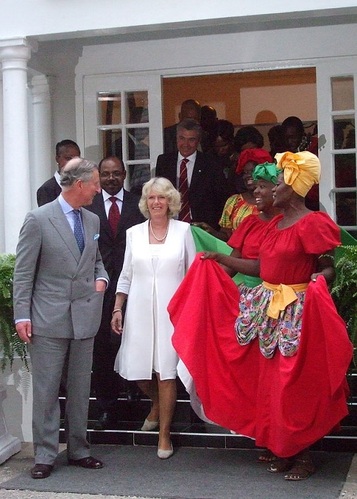
–>
December 2, 2022
An event honoring domestic violence charities, hosted at Buckingham Palace by Queen Consort Camilla made international news. The attention wasn’t focused on the good work of the attendees, but on an allegedly racist questions asked by a palace aide. Sky News reported the rapid response by the palace, “All members of the household are being reminded of the diversity and inclusivity policies which they are required to uphold at all times.” Prince William’s spokesperson called the situation “really disappointing.”
‘); googletag.cmd.push(function () { googletag.display(‘div-gpt-ad-1609268089992-0’); }); }
Lady Susan Hussey was part of the Royal Household for over sixty years, lady-in-waiting for the late Queen, godmother of Prince William, and a Lady of the Household. Ladies of the Household help at Palace events, such as the domestic violence reception. She has since resigned.
Ngozi Fulani founded Sistah Space, an East London charity serving women of African and Caribbean ancestry living in London. Fulani’s BA and MA were in African Studies. She had Independent Domestic Violence Advisor from the UK Charity SafeLives. Both the Sistah Space and SafeLives’ websites cite the 2014 murder of Valerie Forde and her baby as inspiration to create Sistah Space. Fulani said the murders inspired concerns that African and Caribbean minorities didn’t have a venue to address intimate partner violence. According to SafeLives website, in 2014 “BAME” (black, Asian and minority ethnic) organizations and mainstream organizations didn’t understand the unmet needs of black victims, a need later filled by Sistah Space, “a community based initiative that supports African heritage women and girls.”
According to Sky News and the Sun, Fulani reported the following conversation with Lady Susan Hussey, describing it as offensive, unwelcome, “prolonged racism:”
‘); googletag.cmd.push(function () { googletag.display(‘div-gpt-ad-1609270365559-0’); }); }
SH: Where are you from?
NF: Sistah Space
S H: No, where do you come from?
H: No, where do you come from?
NF: We’re based in Hackney.
SH: No, I mean what part of Africa are you from?
NF: I don’t know, they didn’t leave any records.
‘); googletag.cmd.push(function () { googletag.display(‘div-gpt-ad-1609268078422-0’); }); } if (publir_show_ads) { document.write(“
SH: Well, you must know where you’re from. I spent time in France. Where are you from?
NF: Here, the UK.
SHL No, but what nationality are you?
NF: I was born here and am British.
SH: No but where do you really come from? Where are your people from?
NH: ‘My people?’ Lady, what is this?
SH: Oh, I can see I’m going to have a challenge getting you to say where you’re from. When did you first come here?
NF: Lady! I am a British national. My parents came here in the 1950s.
SH: Oh, I knew we’d get there in the end. You’re Caribbean.
NF: No lady, I am of African heritage, Caribbean descent and British nationality.
SH: Oh, so you’re from….
Fulani also tweeted that Lady Susan moved her hair to read her name badge.
The top of the Sun’s article features a photo of the event and of each woman. Lady Susan’s purple coat and hat are typical for a very formal event (the photo inside the event shows no hats). The photo of the event with Fulani circled, the photo of her alone, and one further down the page, show exactly what she wore. Her dreadlocks extend halfway down her chest, and topped with a brown hairnet and two-inch wide headband of closely-spaced freshwater pearls. Her sleeveless dress features a print that is faux vague animal, many studs, and brown, ochre and reddish trim apparently woven from heavy twine. The dress was topped with a brown, long sleeved half-shirt. There’s an inch gap between the half shirt’s hem and the bodice of the dress. She had a choker of seashells; a long, heavy gold chain, and a large man’s watch worn over her sleeve. This was a costume suitable for an internet prank or auditioning as an extra in a live-action Flintstones movie. Neither her outfit nor the name on her name tag said, “English lady who has always lived in Hackney.”
Fulani’s recollection includes addressing Lady Susan as “Lady” twice, when ma’am, or no address, would be more usual. “Lady! What is this?” and “Lady! I am a British national.” The wording reported by Ms. Fulani, read aloud, sounds like bad fiction. It appears Fulani is playing with Lady Susan, meeting questions about her background with answers about her charity, then portraying her identity as UK-born British woman, and only later stating her African and Caribbean heritage.
UK-born British citizen Ngozi Fulani was received at Buckingham Palace, by invitation of the Queen Consort. Her ethnic background is the focus of her education and her charity (that receives UK government funding), while she feels free to claim an entirely British identity. She acted quickly to promote the presumption that any questions about her background, from another equally UK-born British lady, are toxic.
Lady Susan was slandered, and the palace defamed by association (The Sun, Newsweek, and Yahoo included the unsupported claim that a royal’s mentioning the complexion of Harry and Meghan’s potential children was racist). After decades of loyalty to the family, she was hastily thrown under the bus. The royals joined her under the bus as they promised to inflict more diversity training on their staff.
The ever-growing list of words, facts and questions, spaces, and fashion choices the majority are expected to forgo, and expectations to fund and laud charities such as Sistah Space hasn’t diminished reports from minorities like Fulani that wounds continue to be inflicted on her by a culture that both welcomes and assists her in her goals — a culture she wants us to recognize as fully her own.
Fulani told the Guardian that since the lockdowns, African and Caribbean ethnic minorities requests for DV services increased 300%, while 80% don’t file police reports, citing fear their men would suffer from police intervention. The lockdowns may have preceded the huge increase in clients, but the services available from Sistah Space preceded the lockdowns. According to the UK charities registry, this organization provides self-identified victims of family abuse necessary items from their charity shop and assist clients with courts and agencies. But Sistah Space does more. It provides diversity training to individuals and organizations.
On paper, Ngozi Fulani is the very sort of professional palace staff and individuals like Lady Susan Hussey would seek for educate them on ways to minimize unintended distress among minorities. One would think such a professional, and a proud UK-born British citizen, would have seen the conversation at the palace as an opportunity to help Lady Susan and/or palace staff. But Fulani did a greater service than that. Ngozi Fulani showed us all how hollow and mean-spirited diversity training, and the people who demand it be promulgated, really are.
Image: Mattnad
<!– if(page_width_onload <= 479) { document.write("
“); googletag.cmd.push(function() { googletag.display(‘div-gpt-ad-1345489840937-4’); }); } –> If you experience technical problems, please write to [email protected]
FOLLOW US ON
<!–
–>
<!– _qoptions={ qacct:”p-9bKF-NgTuSFM6″ }; ![]() –> <!—-> <!– var addthis_share = { email_template: “new_template” } –>
–> <!—-> <!– var addthis_share = { email_template: “new_template” } –>







